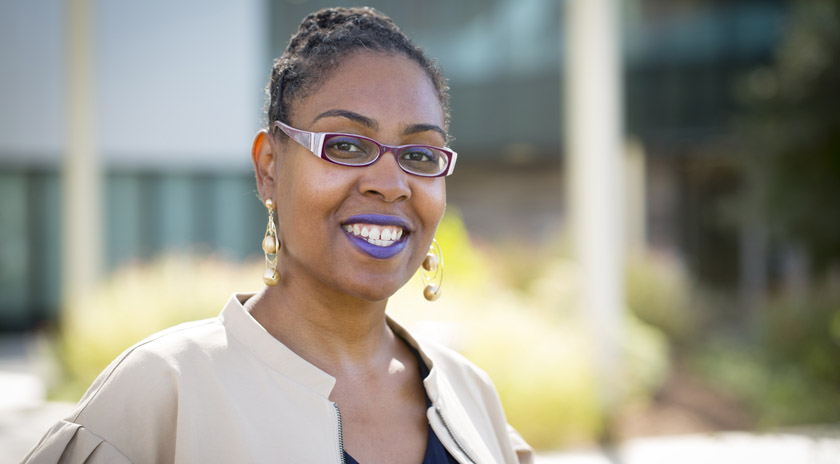Researcher seeks to support African Americans living with dementia, along with caregivers

Fawn Cothran was a young child in Washington, D.C., when behavioral changes appeared in her paternal great grandmother. Family members took turns helping as her condition worsened, but despite what would now be considered obvious dementia symptoms, they never discussed her decline in terms of illness.
“The adults just said, ‘she needs some help, so everybody in the family needs to take their turn. That’s what we do,” Cothran said. The experience of growing up with her grandmother endeared her to older adults, which led her to become a gerontological nurse. The memory of watching family members caring for her great grandmother inspired her life’s passion: researching caregivers of family members who have dementia.
As an assistant professor in the Family Caregiving Institute at the Betty Irene Moore School of Nursing at UC Davis, Cothran conducts research focusing on the stresses that affect African-American family caregivers.
Since her childhood, little has changed in the dynamics of African-American families affected by dementia. African Americans are far less likely than the general population to place family members with dementia in long-term care facilities.
In addition, Cothran says, “African-American caregivers spend disproportionately more time managing the behaviors of care recipients, and they’re more likely to reduce their hours of employment to make time for their caregiving role.” As a result, these caregivers, predominantly adult children, endure substantial emotional and economic stress.
“Cultural factors determine why many African Americans keep care responsibilities within the family,” Cothran says. “Stigma surrounding mental health persists in African-American communities. Behavioral changes usually are dismissed, explained away or simply not discussed. Instead of trying to explore the cause for behavioral changes, family members might say ‘well, she’s always been that way’ or ‘that’s what happens when you get older.’” Through research interviews that Cothran conducts with African-American family caregivers, she develops insights about their unmet needs for assistance.
“The unacknowledged stress that caregivers experience ultimately affects the people they’re caring for, because even people with advanced dementia still may be able to perceive the body language and emotions of others,” Cothran says.
Because caregivers may deny feeling stressed, Cothran is seeking funding to analyze blood and saliva of caregiver study participants to scientifically document and measure stress levels. She plans to develop interventions to help reduce stress and demands on caregivers while respecting cultural values.
These efforts require Cothran to collaborate with numerous faculty members in the School of Nursing and the UC Davis Alzheimer’s Disease Center. Her key contributors include faculty members with expertise in gerontology, medical sociology, neurology, Alzheimer’s disease, health disparities, statistics, geriatric psychiatry and public health.





